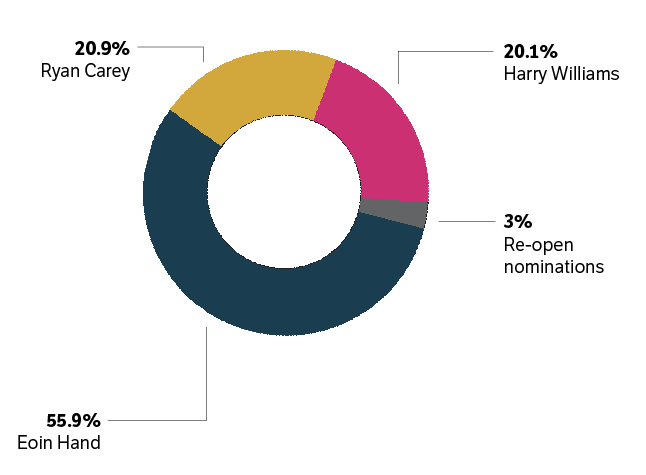Eoin Hand will be elected president of Trinity College Dublin Students’ Union (TCDSU) on the first count in this year’s elections, according to the results of a poll of 1,131 students conducted by The University Times.
President
The poll predicts that Hand will receive 55.9 per cent of first-preference votes, with Ryan Carey set to receive 20.9 per cent and Harry Williams in third with 20.1 per cent.
Hand’s strong start to the campaign has stood to him: while his performance at Media Hustings on Thursday was considerably weaker than his previous efforts, it evidently hasn’t damaged his chances.
But, as Hand’s counterpart Williams has pointed out several times as part of his call for union reform, the hustings have largely only been attended by reporters and candidates’ campaign teams. Hand’s lead, therefore, is a result of a number of factors.
Hand is leading among all four year groups, but his lead is greatest among first years, where he is on course to win 66.5 per cent of the vote. Hand’s pledge to work for students who “just come in everyday, go to lectures, eat their lunch and go home” is likely to have been well received by first years still finding their feet.
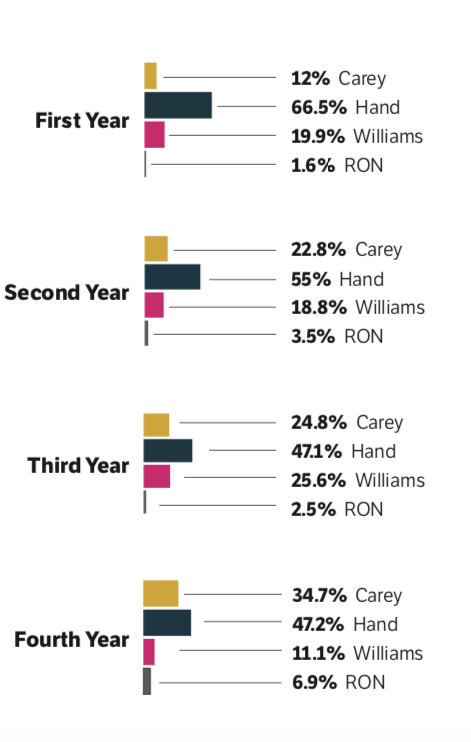
Carey is faring best among fourth years – his and Hand’s own year group – with 34.7 per cent of votes to Hand’s 47.2 per cent. At 12 per cent, Carey is weakest among first years, who will likely have the least experience of the union.
Williams garnered 19.9 per cent of the first-year vote, possibly because first years are the least likely to have major issues with the union and thus veer towards Williams’s call for sweeping change to its structures. Unsurprisingly, Williams is polling best among his own year group, third year, at 25.6 per cent. The vote is most split in this group – Carey is on course to take 24.8 per cent, and Hand 47.1 per cent. Williams failed to reach 20 per cent of first preferences, however, in any of the other three year groups.
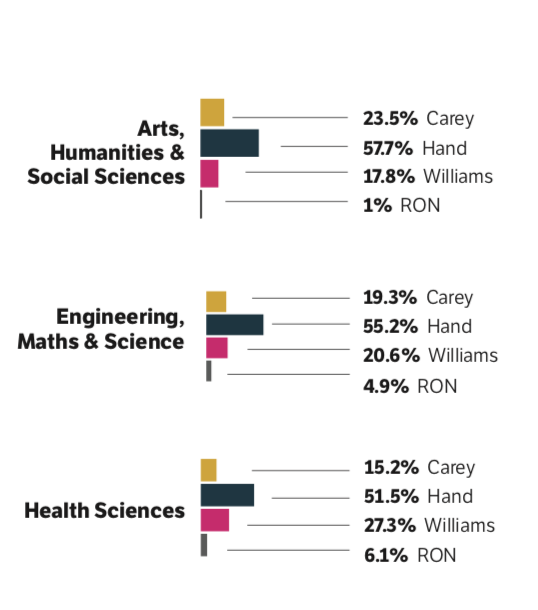
Breaking down the poll results by faculty, Hand again has a clear lead, gathering more than half the vote for each of Arts, Humanities and Social Sciences (AHSS), Engineering, Maths and Sciences (EMS) and Health Sciences (HS).
His lead among AHSS students, at 57.7 per cent, is marginally ahead of the other two faculties. It seems the greatest portion of Williams’s vote will come from HS students, with 27.3 per cent of votes in that faculty going to him. Williams’s line of many students being entirely unaware of the mere existence of the students’ union may be proving effective with students based off campus. Carey has pledged to introduce late-night office hours for students on placement, but given that he only won 15.2 per cent of this vote, access to the union may not be the main priority for HS students.
Hand’s lead won’t come as a surprise to many – he quickly emerged as a middle-ground candidate in this year’s campaign, offering perhaps a more palatable alternative to Carey’s platform of “experienced leadership” and Williams’ vehemently anti-establishment narrative. Williams’s presence pushed Hand, who in other years would likely have been considered the “outsider”, into the centre of the spectrum. He has a wide appeal across faculties, repeatedly bringing up issues in the Hamilton building, where most EMS students are based for lectures, while also promising to lobby against the rumoured demolition of the Players Theatre.
Even if this was an afterthought – he only added it to his manifesto on Thursday – it appears to have worked. Carey also appears to have fine-tuned his campaign to tell students what they want to hear: while it was clear at the beginning of the week that he was pushing himself as the candidate with the most knowledge of the inner workings of TCDSU, he has more recently spoken of his own feeling of alienation from the union in the two years before he got involved.
Editor of The University Times
In the first properly contested race for the role of Editor of The University Times, our polls predict that Cormac Watson will defeat Susie Crawford to the position.
Watson to Triumph Over Crawford
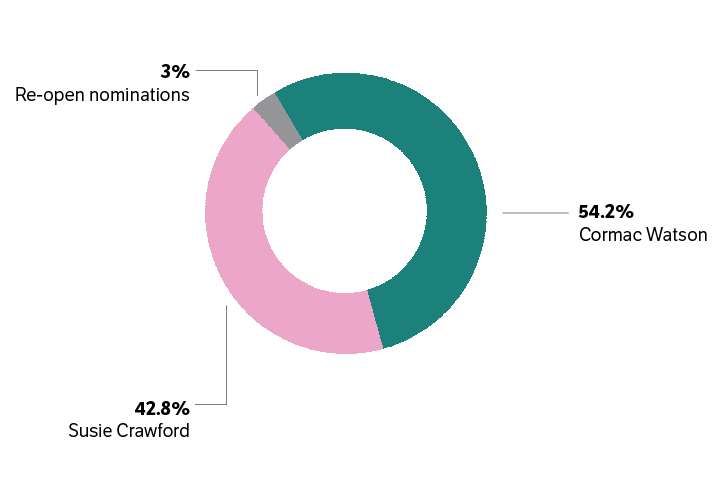
According to the polls, Watson – the paper’s deputy editor – will claim 54.2 per cent of the vote compared to Crawford’s 42.8 per cent, in a race that sees only a tiny number of students planning to vote to re-open nominations (RON).
Watson has edged ahead of Crawford in the votes from every year group, receiving 55.6 per cent of the vote from first years, 55.4 per cent from second years, 53.1 per cent from third years and 55.3 per cent from fourth years.
Crawford, a fourth-year English student, polls best among her own year group, with a predicted 44.1 per cent of the vote.
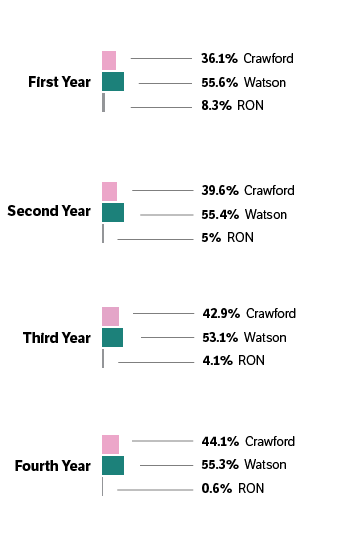
The candidates have both impressed at hustings, with a series of policies that focus more on inclusion than on the paper’s journalism. While Watson has predictably played up his experience, Crawford has unmistakably pitched herself as a candidate of change – pledging to create a less “insular” version of The University Times.
It is interesting that the vote to re-open nominations is at an incredibly small three per cent of the vote, down from last year’s 11.8 per cent in the race for the position. However, 2018’s contested race for the position between then-Deputy Editor Eleanor O’Mahony and joke candidate Michael McDermott ran an even lower re-open nominations count of just 2.1 per cent. This trend appears to show that voters are less likely to vote to re-open nominations if the race is contested – whether that be a serious contention or not. Last year, current Editor Donal MacNamee was elected on the first count with 83 per cent of the vote, slightly shy of the predicted 88.2 per cent.
The high level of voters who report that they are unsure as to who they will vote for is notable. Although the 46.1 per cent of undecided voters for Editor of The University Times is below the average 51.65 per cent across the races, this is still a significant chunk of potential voters who could be persuaded to vote either way.
Watson’s lead can be partly attributed to his popularity with EMS students and HS students, where he received 60.2 per cent and 59.5 per cent of the vote respectively. Crawford narrowly has a lead in the AHSS faculty 50.5 per cent of the vote, compared to Watson’s 48 per cent.
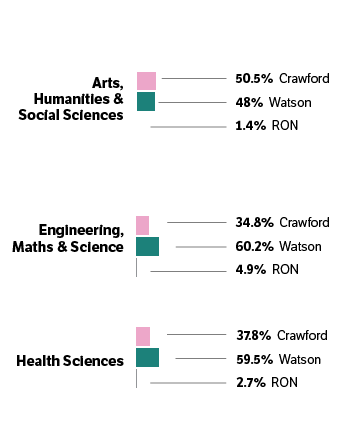
On accessibility and inclusivity, both candidates have expressed their desire to do more. Crawford has recalled her own experiences writing for the paper to substantiate her calls to create a “more accessible and friendly” paper. Watson has relied heavily on his argument that the “thousands of hours” he has put into the paper over the course of three and a half years, have equipped him with the skills to lead it effectively.
One point present in the manifestos of both Crawford and Watson, and noticeably absent from hustings, is the proposal to reduce the number of issues printed in each run – a point of contention for candidates in years past. Both candidates come at the choice from an environmental standpoint rather than a financial one, and the only main difference is the amount by which they will reduce the run. Watson advocates for the papers to be cut by a third, whereas Crawford is suggesting a 40 per cent decrease.
Communications and Marketing
In a race that sees little to differentiate the two candidates, it appears that Philly Holmes has taken the lead in the competition to become TCDSU’s communications and marketing officer.
Holmes On Course for Decisive Win in Comms
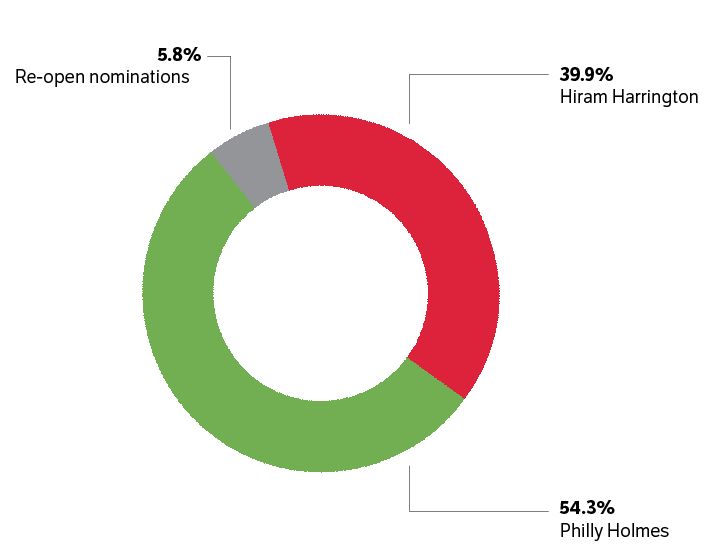
According to our polls, Holmes is set to win 54.3 per cent of the vote, surpassing Hiram Harrington, who is predicted to secure 39.9 per cent.
The large majority for Holmes is a surprising one, namely because this race was not clear-cut. With campaigns that centred on somewhat identical policies, it has been difficult to distinguish between the two candidates with both failing to memorably outperform one another at any hustings.
Holmes pulled ahead in votes from every year but fourth years. He will take 56.9 per cent of the vote among first years, 58.8 per cent among second years and 58.5 per cent among third years. However, it was Harrington who won the vote among fourth-year students, claiming 51.8 per cent of the vote compared to 35.7 per cent for Holmes.
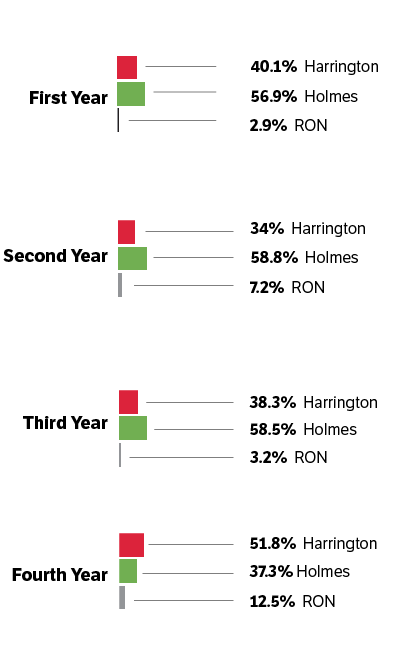
Throughout the campaign, from the series of gruelling hustings to the undeniably draining work of on-campus campaigning, Holmes and Harrington often found themselves iterating similar manifesto points and strategies, with the primary focus of both campaigns being inclusivity and accessibility. With both candidates also ardent advocates for change within TCDSU, they repeatedly struggled in their respective attempts to find a unique pitch.
The two candidates may be well-known faces around campus, but it was Holmes who conquered every sector of the college. Gaining 57.9 per cent from AHSS students, 50.6 per cent from Engineering, EMS students and 51.9 per cent from HS students, it’s clear that Holmes has tapped into something that appeals to all students.
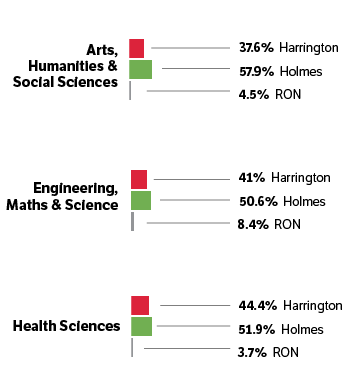
However, what is important about this race between the two incredibly similar candidates is the large number of undecided voters. With an average of 51.65 per cent of voters unsure of who to vote for across the races, the mean for the communications and marketing race is well above this, at a remarkable 60.2 per cent – capturing those votes could be key in turning around the result before students have their say.
Perhaps Holmes’s success in the polls can be credited to his large campaign team. It was no easy feat to navigate Trinity’s campus this week without coming across at least one member of the candidate’s band of campaigners. He has made clear attempts to attract voters, choosing to invest in smaller flyers to reduce waste, while also encouraging students to “meet the candidates” through his speed-friending event.
Education
Megan O’Connor, the sole candidate in the race to become TCDSU’s education officer, is expected to easily win her race, having achieved 85.3 per cent of the vote.
Comfortable Election for Megan O’Connor in Education
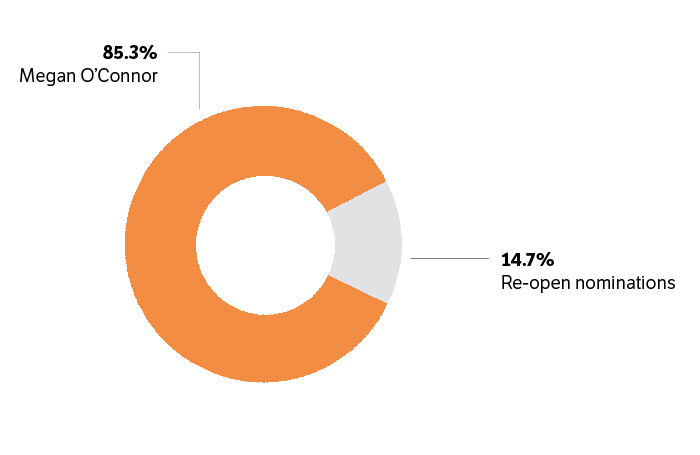
Some 14.7 per cent of voters are seeking to re-open nominations, meaning that O’Connor has the highest re-open nominations vote of the uncontested races. Across the six races, an average of 51.65 per cent of voters say that they are unsure about who they will vote for in the elections. In the education race, 54.2 per cent of voters report that they are unsure about whether to vote for O’Connor or to re-open nominations, exceeding therefore exceeding this average.
O’Connor has built her campaign on a promise to refocus the education office’s attention towards the more localised, day-to-day issues facing students. She has pushed the message that by tending to those on-the-ground issues, she can work to abate the position’s biggest challenge: student engagement.
The final-year general nursing student currently serves as the union’s off-campus officer. Her predicted win can perhaps be attributed to her well-known presence on campus that is a product of her extra-curricular work around Trinity.
O’Connor is currently the chair of the Nursing and Midwifery Society, and has been a vocal critic of Trinity’s handling of health science placements. She has also been a strong supporter of the national nurses strike last year. Unsurprisingly, then, O’Connor is most popular with HS students – 88.9 per cent of those who polled say they will vote for her.
Her campaign’s focus on ground-level issues, however, has placed her manifesto under the looking glass. At hustings, questions regarding the overarching threat posed by the ongoing third-level funding crisis served to undermine some of her key manifesto points. Her steady footing on more local issues such as the Trinity Education Project (TEP), however, appears to have gained her the voter approval she will need in order to get elected.
Entertainments
Uncontested ents candidate Hugh McInerney is expected to have an easy win on the first count in this year’s elections, scoring 86.2 per cent overall while re-open nominations (RON) is set to claim just 13.8 per cent. The results will likely add to what’s been a pretty laid back campaign for McInerney thus far.
McInerney Untroubled by RON Vote
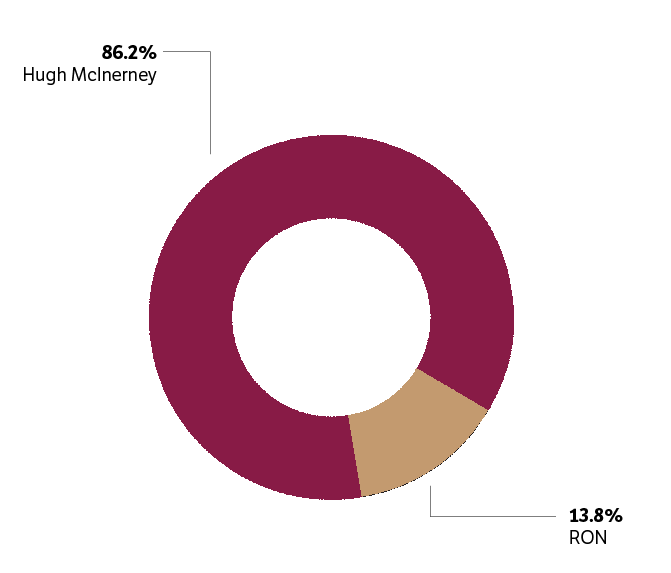
McInerney’s high polling counts follow successful performances during last week’s hustings, during which he repeatedly stressed his primary manifesto points, such as his plans for Sober October and wide-reaching society collaborations.
McInerney has also referred on several occasions to his involvement with Trinity’s Film Society, which he points to as evidence of his suitability for the ents position. Prior to campaigning, McInerney met with various societies on campus in an effort to get them more involved in ents events, and has discussed his ideas for harm reduction with Students for Sensible Drug Policy.
His plans have stirred little controversy in the line of questioning, and perhaps his success thus far can be attributed, in part, to his confidence and charisma.
While last year’s race featured three eclectic candidates, each presenting different ideas of what they could bring to the role, this year’s voters will have to trust that McInerney will stay true to his ideas, which do not stray far from proposals of past ents candidates. With a strong emphasis on making events accessible and inclusive, the passion project of McInerney’s manifesto, Sober October, could be his largest selling point.
The breakdown of McInerney’s votes is relatively unsurprising – he secured 86.8 per cent of the vote against RON amongst EMS students. In the HS department, McInerney performed best, securing 89.9 per cent of votes, while AHSS showed he convinced 85.1 per cent of voters.
Welfare
Leah Keogh is running uncontested for the role of welfare officer and is predicted to cleanly win her race, with 89.2 per cent of the vote.
Leah Leogh Makes Short Work of RON
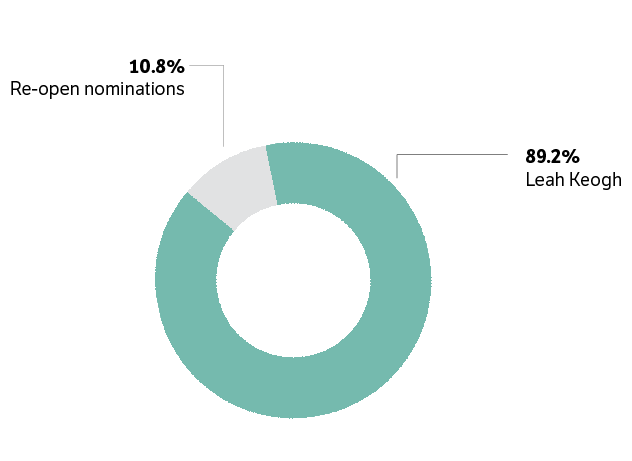
Only 10.8 per cent of voters are seeking to re-open nominations, meaning that Keogh has the lowest re-open nominations vote of the uncontested races. Some 51.3 per cent of voters were unsure about whether to vote for Keogh or re-open nominations, which is about in line with the average.
Although historically a popular role – with past elections seeing as many as five candidates running for the position – this year marks the third consecutive year of uncontested welfare races. Given the high-profile nature of many welfare issues, it is surprising that this has not manifested itself in greater competition for the role.
In comparison to incumbent TCDSU Welfare Officer Aisling Leen, Keogh has less than half the percentage of votes to re-open nominations. Last year, it was polled that Leen would win on the first count with 77.2 per cent of the vote. On the night, she was elected with 80.54 per cent of the vote.
Keogh’s manifesto centres around a “cornerstone” point: tackling financial hardship amongst the student body. She has also listed issues related to consent, harm reduction and accessibility as key areas of concern. With experience on TCDSU’s welfare committee, it is expected that Keogh will maintain the progress made in recent years in the areas of consent and sexual assault reporting.
Keogh polls well across all year groups, with her highest vote among third years where she secures 91.3 per cent of the vote. Keogh receives 90.9 per cent of the vote from first years, a high result that is indicative of her successful campaigning in Halls.
The Biggest Student Issues
Our polling revealed that housing is the most important issue for students, with 37.93 per cent citing it as their number-one issue.
This was followed by the climate, with 31.03 per cent of students saying that was the area of most concern. Some 24.22 per cent of students said that education was the most important issue to them, 11.22 per cent said it was health. Irish unity was the least popular issue among students, with just 3 per cent of students saying it was their number one.
Among first year students, climate was the most important issue with 32.6 per cent. This was followed by housing at 29.2 per cent and education at 22.2 per cent.
Housing took precedence among second-year students, with 38 per cent of those polled citing it as their priority. This was followed by climate at 31 per ent and education at 22.5 per cent. Health received 6.4 per cent of the first preferences, and Irish unity got the fewest, with just 2.1 per cent.
Housing was also the most important issue among third years, with 37.2 per cent saying it was the most important matter. Climate followed at 24.6 per cent, and education at 24.2 per cent. Health had 10.6 per cent and irish unity had 2.9 per cent.
Housing was resoundingly the priority for fourth years, with 50 per cent. Climate followed at 25.5 per cent. Education received 15.7 per cent of the first preferences, Irish unity got 4.9 per cent and health received 3.9 per cent.
Methodology
From Wednesday, February 19th to Friday, February 21st, The University Times conducted a poll of 1,131 students in locations on and off campus. Polling was focused for the most part in the Arts Block, the Hamilton building, Goldsmith Hall, Trinity Biomedical Sciences Institute (TBSI), the Museum Building and D’Olier St.
Using a significance level of five per cent, and an estimated voter turnout of 3,444, we are able to report our results with a margin of error of 2.74 per cent.
We have predicted the likely winner of each race by gathering the first preferences for candidates in the TCDSU elections, and inferring later preferences by the distribution of first preferences. Students were also asked whether they were aware of the elections, and to rate their satisfaction with information presented on elections on a scale of one to five.
They were asked to rank a list of five issues in order of importance: climate, housing, health, education and Irish unity.
Finally, they were asked to rate from one to five their satisfaction with the student spaces they have access to and changes made under the Trinity Education Project.
None of our results this year is predicted to fall within our margin of error, so we can be reasonably confident about the results of these polls.
This is the largest sample size The University Times has ever collected ahead of TCDSU election races. The paper has correctly predicted the final outcome of almost all previous elections.
Aisling Marren, Molly Furey, Ciaran Molloy, Emer Moreau and and Eliana Jordan also contributed reporting to this piece.
Aoife Kearins conducted data analysis, cross tabulation and modelling.

